Have you ever thought about what would happen if the world ended? Maybe it’s just me, but I find it quite interesting to think about the end of the world. These thoughts may be both exciting and scary, whether they are zombies knocking on your door or aliens coming from deep space. So, let’s look into some of the most common apocalyptic scenarios and how we could survive them—because who doesn’t want a backup plan for when things go sideways?
The Zombie Apocalypse: Prepare for Brain Munchers!
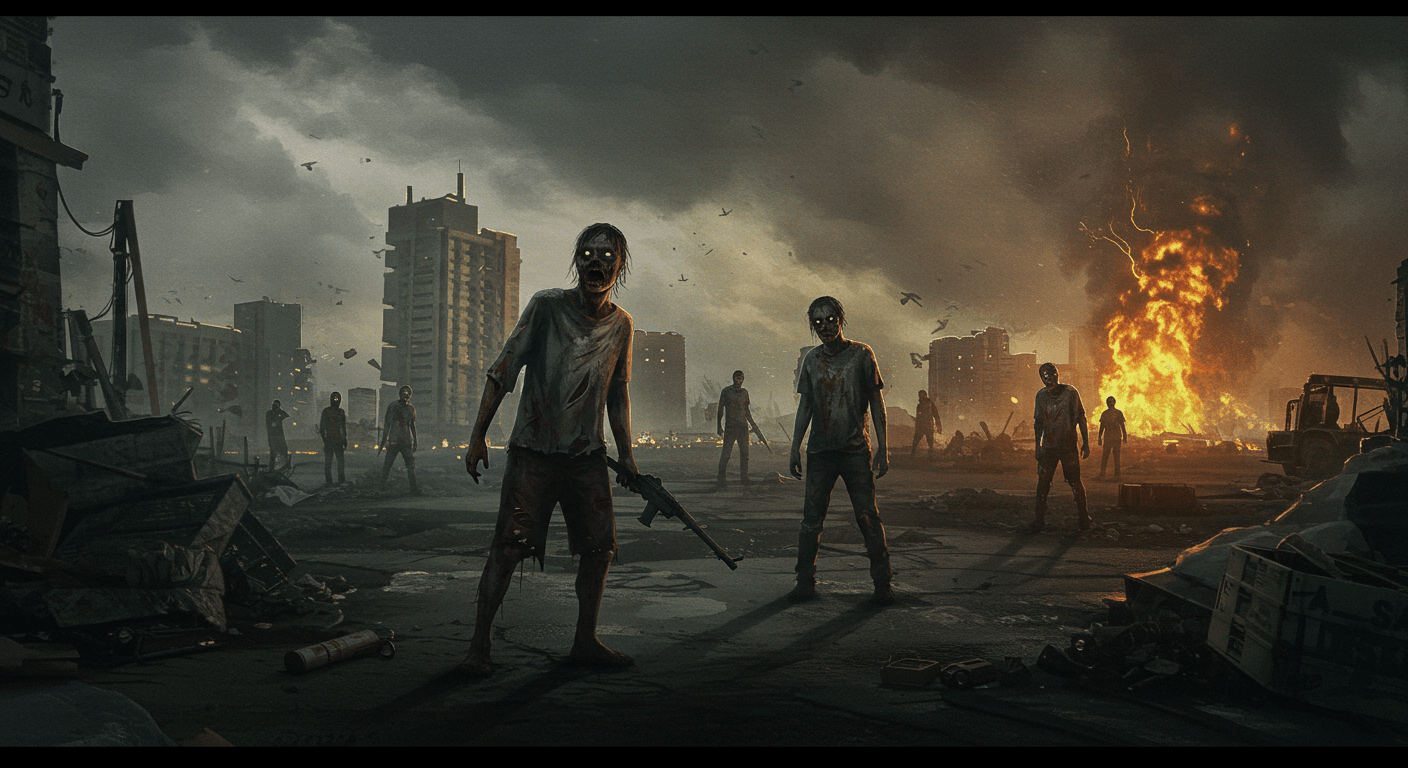
Please Note: This post may contain affiliate links. If you click one of them, we may receive a commission at no extra cost to you. As an Amazon Associate, I earn from qualifying purchases.
The zombie apocalypse is the one doomsday scenario that really gets our hearts pounding. I mean, what could be more fun than running away from monsters that want to eat your brain while looking for food? Movies and TV series like “The Walking Dead” have made this situation more common, so we all think we know how to survive a zombie apocalypse.
Let’s start with the location. If you live in a city with a lot of people, you might as well be surrounded by zombies! On the other hand, rural communities might have better prospects of finding food and shelter. You may make a safe zone by putting up barricades around your home or finding an empty building that seems like it could keep zombies out. Don’t forget to stock up on things like canned goods and water. No one wants to be hungry when the zombies rise up.
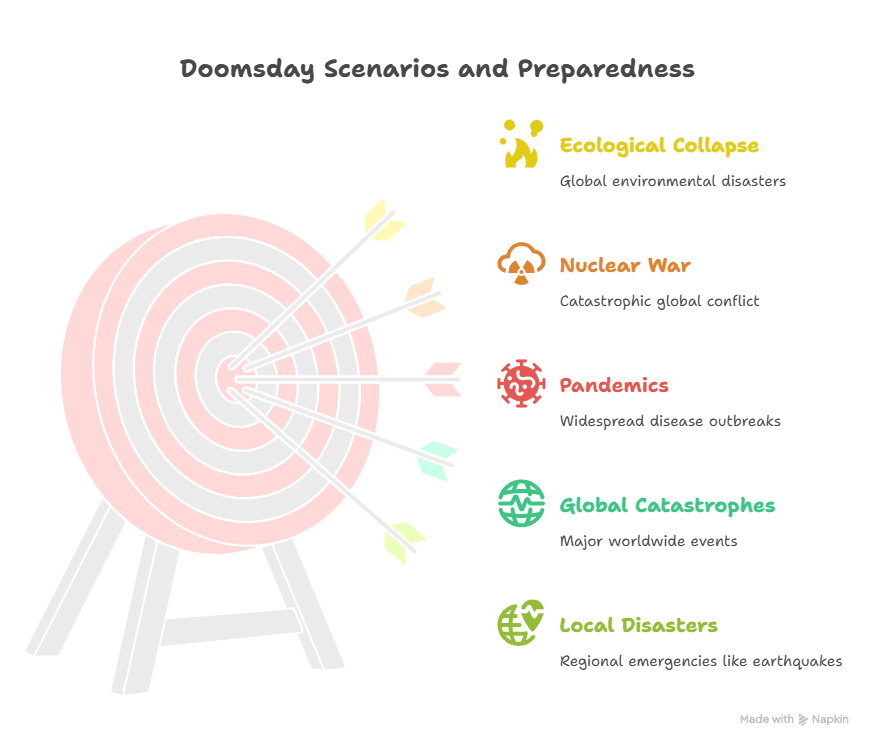
But let’s not forget how important it is to work together. Think about that friend who always stated they’d be there for you. Now is their turn to shine! When the zombies come knocking (or shambling), having a good group of people can mean the difference between living another day and being a midnight dinner for the undead. You wouldn’t want to face a group of zombies that wanted to eat your brain all by yourself. That would be scary!
First, think about what skills each person on your team has. Zombie stew won’t create itself, so you’ll need someone who can cook. Picture yourself going through canned items to figure out how to make a meal that doesn’t taste like cardboard. A good cook can make food out of those things that is decent enough to eat, and maybe even taste nice. Every meal seems like a small win over despair.
In addition to knowing how to cook, it’s important to have a friend who understands how to use a baseball bat well (just in case). You want someone who knows what they’re doing, like someone who’s played sports or taken self-defense lessons. You might not realize it, but swinging at zombies takes more skill than you think. And let’s be honest: there’s nothing quite like seeing your friend act like an action hero and kill a zombie in style. It’s fun and makes you feel better!
It’s interesting how morale may be really important in doomsday situations. Seeing a lot of reanimated corpses might be very scary, but having friends around can help. Imagine this: You’re stuck in an empty building with commotion outside, but instead of freaking out, your team starts singing or telling ghost stories around a campfire (with no real ghosts, hopefully!). Those times of laughter are incredibly important for keeping everyone’s spirits up and reminding them why you’re all fighting together in the first place.
Also, collaboration lets people divide up tasks. For example, one person can stay watch while another person gets supplies or strengthens your shelter. This way, you’re not just sitting around waiting for death; you’re doing something to stay alive! Everyone has something they are good at and things they need to work on. Knowing what they are makes the group stronger and ready to face any problem.
In the end, getting through apocalyptic scenarios isn’t only about your own abilities or resources; it’s also about building relationships and helping each other through bad times. So get your team together! Make sure that everyone knows what their job is and that they are important to the group. If we ever have to fight zombies together, and let’s hope we don’t, I’d rather have my buddies with me than face it alone!
Natural Disasters: Mother Nature’s Fury
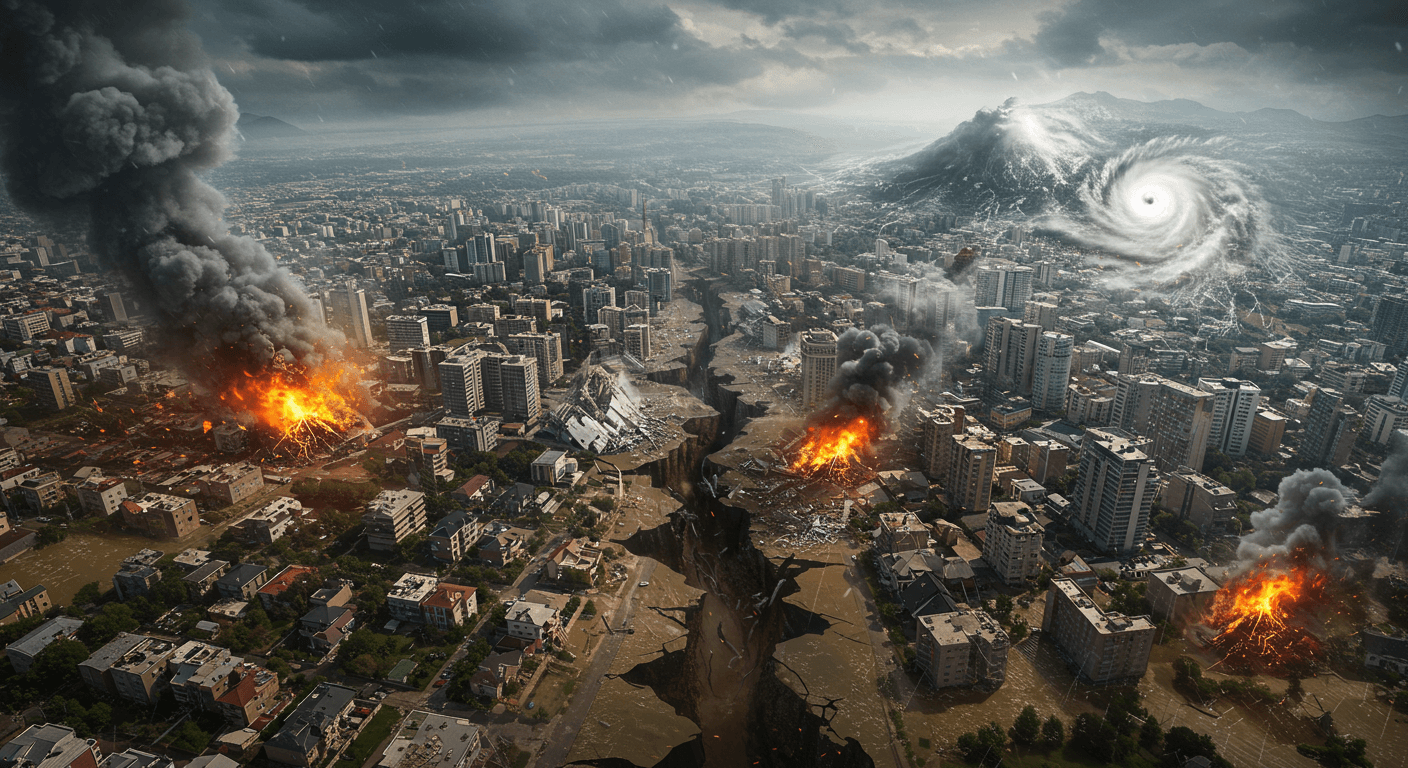
To be honest, natural disasters are definitely one of the most likely things to happen that will end the world. You name it: earthquakes, hurricanes, floods, and more! These things show us how strong Mother Nature can be and why it’s so important to have an emergency pack.
The first thing you should do to get ready for a natural disaster is make an emergency plan for your family. Talk about where everyone should go if something happens, such going to a neighbor’s house or going to higher ground during floods. It sounds easy, but believe me, things get out of hand fast when anything bad happens!
Now let’s talk about the emergency kit I told you about before. Getting a lot of non-perishable foods, such granola bars (who doesn’t love those?), and bottled water is really important. Don’t forget a flashlight with additional batteries. It’s not enjoyable to be stuck in the dark unless you’re playing hide-and-seek with buddies. And since we’re talking about fun, think about bringing games or activities for kids in case you’re confined indoors for days.
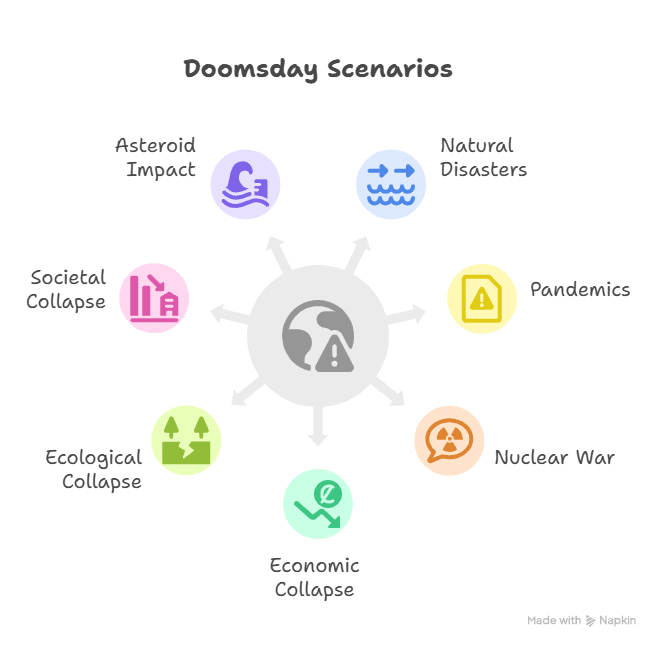
It’s interesting that doing exercises can assist too! Like fire drills at school, mock catastrophe drills at home help everyone know what to do when things go wrong. Have you ever thought about how crazy things could go in a true emergency? It’s like looking for your favorite snack in a cluttered kitchen—it’s a huge mess! So why not get ready to make things easy for yourself?
First, let’s speak about how important it is to be familiar. You’re really practicing for the big show when you go through these fake disaster scenarios. Picture your family having to leave their home due of a flood or even a zombie apocalypse (which could happen!). If everyone understands what to do and where to go without having to think about it, you’ll save a lot of time and prevent the anxious rush that often causes confusion. Also, who wants to be the one asking, “Where’s the emergency kit?” when everyone else is just standing about looking confused?
Imagine this: you’re watching TV in your living room when a storm knocks out the electricity. Instead of racing around like crazy people, everyone calmly recalls what they need to do. Maybe Dad takes the flashlight from where it belongs while Mom gets food (since that’s more important), and the kids know exactly where to go in case of an emergency. With this amount of preparation, a possible calamity can turn into simply another night with a little extra fun!
Also, rehearsing these drills can help reduce tension, especially for younger family members who might be scared by terrifying news reports or movies about disasters. They learn that crises are serious business, but there are things we can do as a family to keep safe by doing fun but instructive activities together. If you can make something scary into a fun activity with lots of laughing and teamwork, why wouldn’t you?
And don’t forget about talking to each other! These drills let everyone say what they are worried about or want to know about what might happen in different situations. Have you ever talked about how to stay alive over dinner? Most of the time, it’s more fun than useful! But when individuals practice, they tend to take things more seriously. Everyone gets engaged and gives their thoughts on how to deal with different scenarios.
Along with all the great bonding and skill-building time at home, performing drills makes families more resilient. You get better psychologically and emotionally ready for anything life throws at you, from natural calamities to everyday problems. Everyone feels more confident when they know they’ve practiced together; fear turns into strength.
So go ahead and schedule some time each month to practice catastrophe drills with your family! You can practice an evacuation route or learn basic first aid skills together (extra points if someone pretends to be hurt). Every minute you spend getting ready pulls you closer as a group ready for everything life throws at you, including zombies!
Alien Invasion: Out-of-This-World Survival Tips

What if aliens decide that Earth is the perfect place for their next vacation? It’s impossible not to think about what we would do if aliens appeared on Earth with all the sci-fi movies that show alien invasions (I’m looking at you, “Independence Day”).
You need to think quickly and maybe even be a little creative to survive an alien invasion. First of all, think about taking safety underground or in rural areas away from big towns. This is because aliens usually attack cities first (thanks, Hollywood!). It might also be helpful to get to know your neighbors, since two brains are better than one when it comes to keeping visitors from another galaxy away!
You might also want to work on your communication abilities, since not all aliens will be able to speak English well. Who knows? Instead of talking things out, maybe they might respond better to interpretive dance or charades.
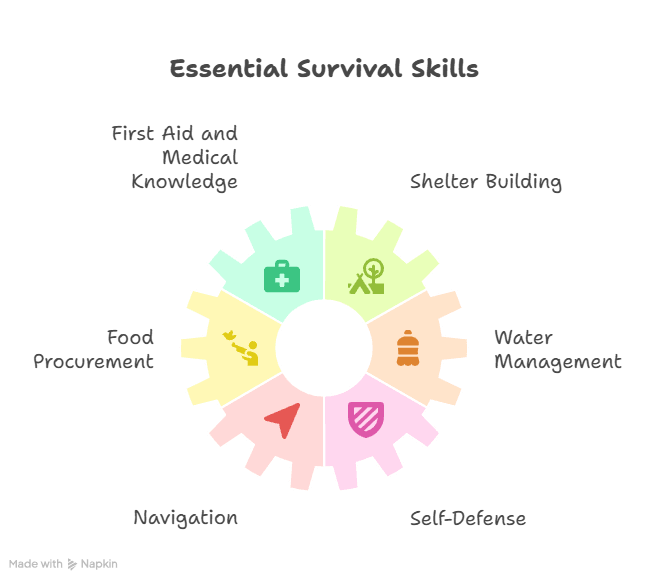
And don’t forget that comedy is important here too! Making fun of UFOs in a lighthearted way could help friends relax during tense times. It’s never a bad idea to laugh when getting ready for the end of the world! I mean, who doesn’t feel better when they can laugh at how silly it all is? Imagine this: you and your buddies are gathered together, talking about how to stay alive when someone makes a joke about how aliens might be seeking for new roommates. What seemed like a hard matter all of a sudden turns into a funny comic!
Like that secret ingredient in grandma’s renowned recipe, humor makes everything better. Laughter can help us relax and feel like we’re all in this together when things get tough. It helps us connect over our common worries and doubts, which makes the whole apocalypse scenario seem less scary. Wouldn’t you rather plan how to beat zombies while laughing than sit about and bite your nails in silence?
If you’re getting ready for something as crazy as an extraterrestrial invasion or a zombie apocalypse, why not add some fun to the mix? You may give each other funny code names, like “Captain Sandwich” or “The Snack Avenger.” You might giggle every time someone talks about supplies because someone said peanut butter is the best food for survival. It’s useful, but who knew it would be so much fun?
Also, humor can help people come up with new ways to solve problems. Our brains are more open to new ideas when we’re calm and having fun. One friend might propose utilizing inflatable pool toys as flotation equipment during a flood simulation (hey, they float!). Another person jumps in with suggestions for how to repurpose old Halloween costumes to hide from those annoying invaders. These crazy ideas frequently lead to unexpectedly good plans, and they keep everyone interested!
And let’s face it; life is uncertain enough without heaping stress on top of imminent disaster situations! We can face problems head-on without feeling overwhelmed if we can find ways to laugh at the crazy around us. It’s like multitasking to tell ghost stories over the campfire while also planning how to get away from aliens.
There is always that one friend who takes things too seriously and rolls their eyes at your jokes. But even they might smile if you remind them that being funny has been shown to lower stress and make people feel better overall. So why not enjoy the silliness together? If we’re going to die, we might as well do it with laughter in the air!
Adding comedy to your planning meetings can also help you remember them for a long time. Years from now, you’ll remember those times with laughing instead of fear. After all, who wants to remember faces full of panic instead of laughter? So the next time you and your pals get together to discuss about preparing for the end of the world, remember to tell some jokes about UFOs or zombie dance-offs. It will make everyone feel better while still getting essential things done.
In the end, laughing in the middle of pandemonium reminds us that we are there for one other, even when we are confronting made-up threats! It makes friendships stronger and keeps spirits up during hard times. It’s the perfect mix of fun and usefulness! So go ahead and make plans for the end of the world, but don’t forget to bring a lot of laughter with you. You never know when they will come in handy!
Economic Collapse: The Financial Fallout

A lot of people are worried about the economy collapsing right now because of changing markets and rising prices. Imagine waking up one day to find that your money has lost all of its worth overnight. That would be panic mode!
To get ready for this kind of crisis, you need to be smart with your money well before it happens. Instead than only using paper money, which could lose value in extreme scenarios, start saving non-cash assets like gold or silver coins that will always have value.
Also, mastering useful skills like gardening can help you be self-sufficient when grocery shops run out of food because of money problems. Think about how good it would feel to go outside your back door and pick a ripe tomato or a crisp cucumber directly off the vine. Growing your own food is quite satisfying. It’s like having a small grocery shop that you own! Plus, it keeps those annoying hunger sensations at bay and saves you money at the same time.
First, let’s discuss about the area. You don’t need a big backyard to start a garden; even a little balcony or windowsill may be a great place to grow plants. These days, container gardening is very popular. You can use old buckets, pots, or even things that are a little strange, like tin cans or wooden boxes. Not only is it good for the environment, but it also gives your place some character. I all, who wouldn’t want to tell their visitors that their salad came from a bright pink flamingo planter?
Now, think about what you want to plant. It’s important to start with plants that are easy to care for. Basil and mint are great herbs for beginners. They don’t take much work, but they add a lot of flavor to food. You can start growing veggies like lettuce, radishes, and peppers as you get more comfortable (and maybe obtain some green thumbs). Honestly, there’s nothing like using fresh-picked vegetables in your meals; they taste so much better than store-bought ones!
Gardening isn’t only about growing food; it’s also good for your mental health. After a long day, digging in the dirt can be surprisingly calming. Taking care of plants gives us a sense of purpose and connection to nature that we often lose in our busy lives filled with devices and schedules. Also, getting your hands dirty could make you feel like a warrior of the soil ready to take on any problem!
Another plus? Gardening can save you a lot of money on groceries! Prices in grocery stores are going through the roof these days, so having your own cache of fruits and vegetables means you don’t have to rely as much on those expensive aisles full of pre-packaged foods. And let’s be honest: who wants to pay five dollars for organic kale when you can produce it yourself for almost nothing? Your tummy and your wallet will both be happy!
Growing food at home is also a great way to get people to eat better. If you can easily get fresh fruits and veggies, you’re more inclined to munch on them instead of junk food (sorry chips!). This change to healthier eating not only improves physical health, but it can also improve mental health.
There may be bumps in the road, like pests trying to eat your favorite crops, but don’t worry! Part of the joy is learning how to handle problems. Over time, you’ll become a very smart gardener. For example, you can use garlic spray as a natural repellant or attract helpful bugs like ladybugs that help keep unwelcome visitors away.
And don’t forget about gardening in the community! If you don’t want to dig up your yard or don’t have enough room, you can join one nearby and have access without having to buy a lot of property or make a commitment. These shared areas help gardeners make friends and give them chances to share tips and trade produce.
In conclusion, gardening teaches us useful skills that help us be self-sufficient when times are rough, even when money is tight! Not only does it make sure we always have fresh fruits and vegetables on hand when we become hungry, but it also nourishes our hearts as we work toward sustainability—and to be honest? Who wouldn’t want to have their own green sanctuary in the middle of all the stress of life? So gather those seeds and start planting. There are adventures waiting for you right outside your door!
Finally, create strong connections with your neighbors. It’s easier to go through challenging times when you can count on each other. It’s important to share resources when established systems break down!
Conclusion: Embrace Your Inner Survivalist!
In conclusion, it never hurts to have strategies in place, whether you’re afraid of zombies walking down Main Street, earthquakes shaking up life as usual, aliens abducting people, or economies falling apart. We have a better chance of surviving whatever crazy ride life throws our way if we get ready mentally and physically ahead of time.
So, get your family and friends together and come up with ideas! After all, confronting doom alone sounds a lot less fun than doing it with people you care about!
Frequently Asked Questions
What are the most common apocalyptic scenarios people prepare for?
The most commonly imagined doomsday scenarios include zombie outbreaks, natural disasters, alien invasions, and economic collapse. These scenarios often appear in movies and books but also reflect real-world concerns like pandemics and financial instability.
Why is teamwork important in a zombie apocalypse?
Surviving a zombie apocalypse requires more than just weapons—it requires strong teamwork. A group can divide responsibilities like guarding, gathering supplies, cooking, and reinforcing shelters. Emotional support and shared morale also make a huge difference in long-term survival.
What essential items should be in a natural disaster emergency kit?
An emergency kit should include bottled water, non-perishable food, flashlights, extra batteries, a first-aid kit, blankets, medications, hygiene items, phone chargers, and important documents. Optional but helpful additions include board games or cards to ease stress during long waits.
How can families prepare for natural disasters?
Families can prepare by creating a clear emergency plan that identifies evacuation routes and meeting points. Practicing regular emergency drills helps everyone stay calm during a real crisis and reduces confusion. Communication and preparation improve survival and safety.
How would someone survive an alien invasion?
In a fictional alien invasion, survival involves seeking safe shelter—preferably underground or in rural areas—and forming alliances with neighbors. Staying hidden, staying calm, and staying open to creative communication methods might also help if aliens don’t speak human languages.
Why are communication skills important during an apocalypse?
Clear communication helps teams stay organized, make smart decisions, and coordinate survival strategies. In chaotic situations, misunderstandings can be deadly, so speaking clearly and calmly can save lives.
What are the first steps to take during an economic collapse?
Preparing early is key. Diversify assets by keeping valuable trade items such as gold, silver, tools, or food. Learn practical skills like gardening, repairing items, and bartering. Build strong relationships with neighbors for mutual support and resource sharing.
How does gardening help during survival situations?
Gardening provides a reliable food source when store supplies become scarce or unaffordable. It also promotes self-reliance, reduces costs, and can even lower stress. Growing vegetables, herbs, and fruits ensures long-term sustainability in uncertain times.
Why is humor mentioned as a survival tool?
Humor boosts morale and reduces stress, helping people stay mentally strong in tough situations. Laughter builds camaraderie, keeps spirits high, and makes even scary survival challenges feel more manageable.
What’s the most important survival tip from the article?
The key message is that preparation and teamwork are essential for survival—whether facing zombies, disasters, aliens, or financial chaos. Having a plan, staying calm, staying connected, and staying hopeful make all the difference.
Suggested Resources
Zombie Survival Guide
https://www.maxbrooks.com/zombie-survival-guide
FEMA Emergency Preparedness
https://www.ready.gov
Natural Disaster Survival Tips
https://www.redcross.org/get-help/how-to-prepare-for-emergencies/natural-disaster.html

Kevin Collier is a seasoned outdoor enthusiast and writer for Trekbug.com, specializing in outdoor adventures, survival strategies, and prepping insights. With a deep love for nature and a commitment to self-sufficiency, Kevin empowers readers to embrace the wilderness confidently. He shares valuable tips, practical techniques, and inspiring stories, helping both novice and experienced adventurers develop essential skills for surviving and thriving in the great outdoors.





